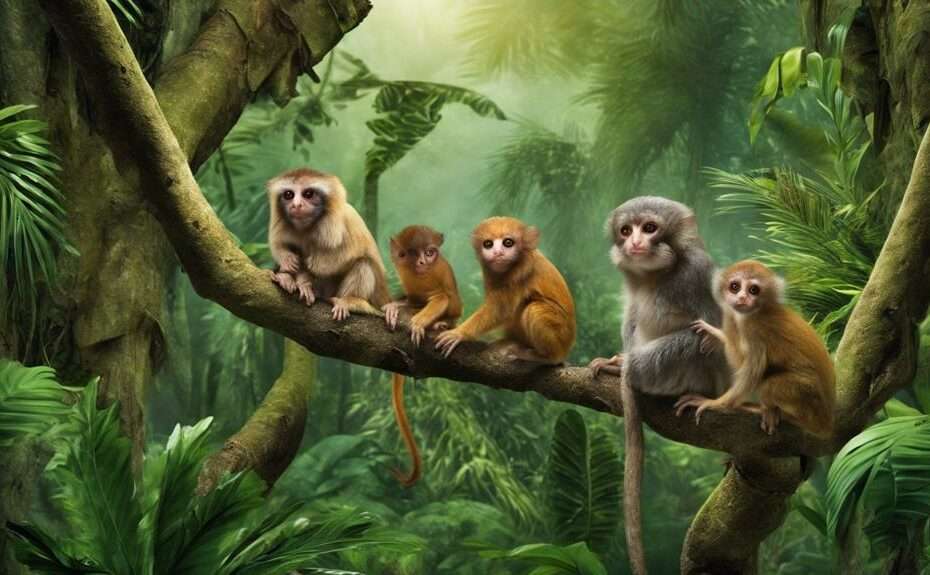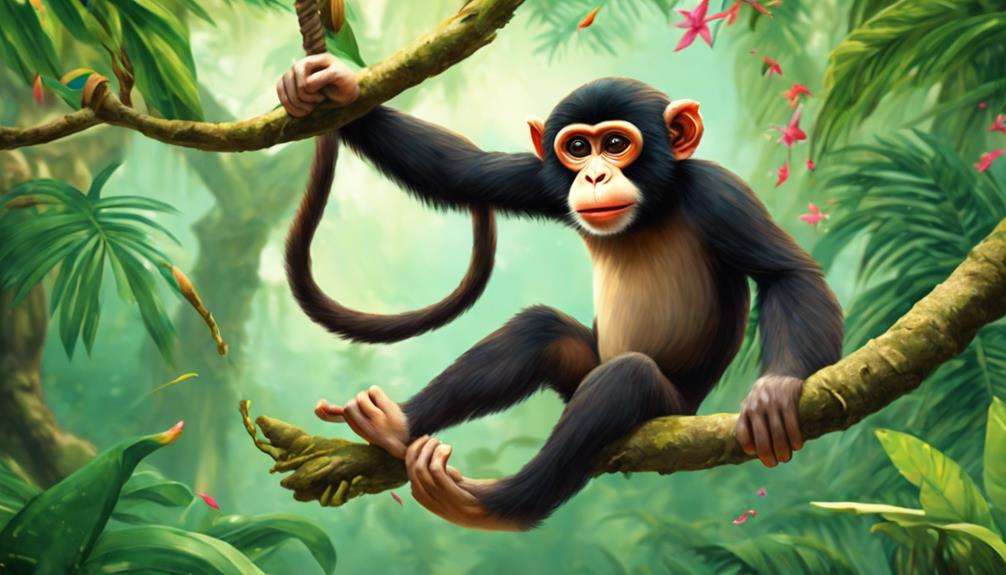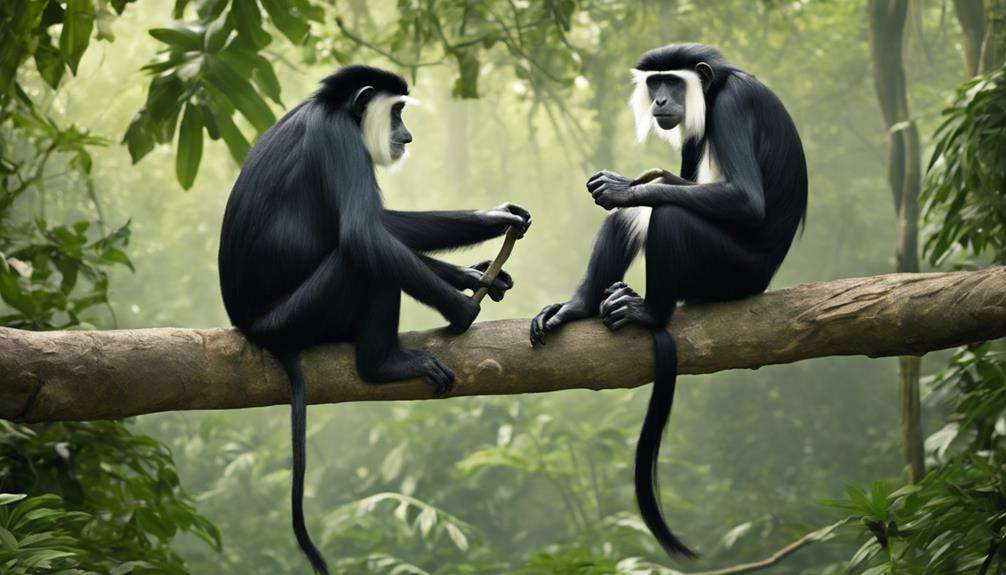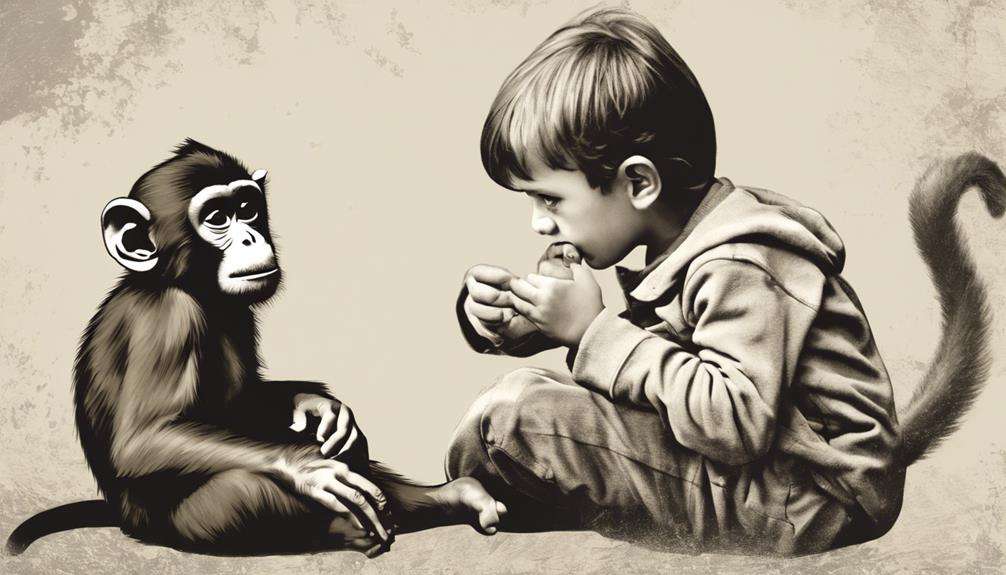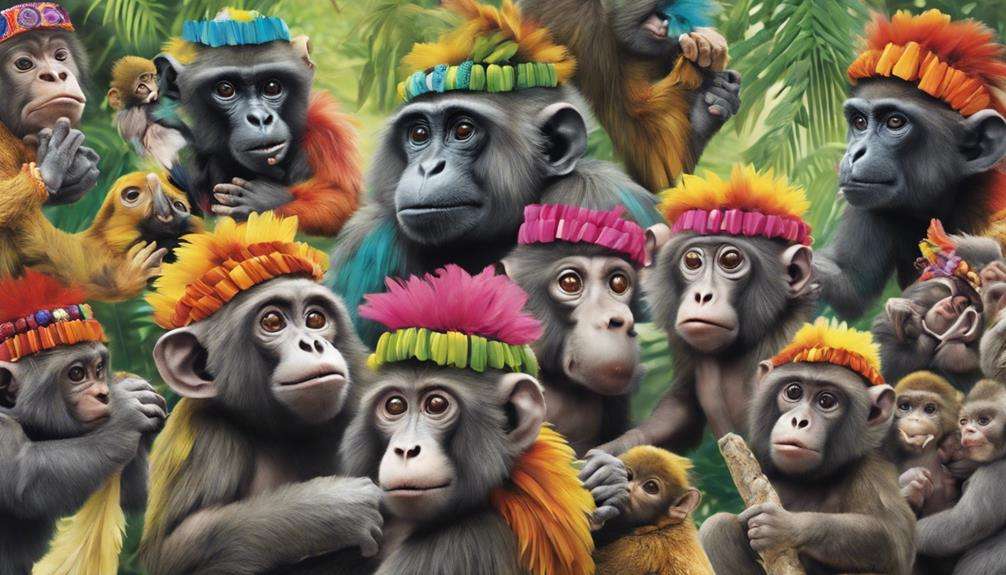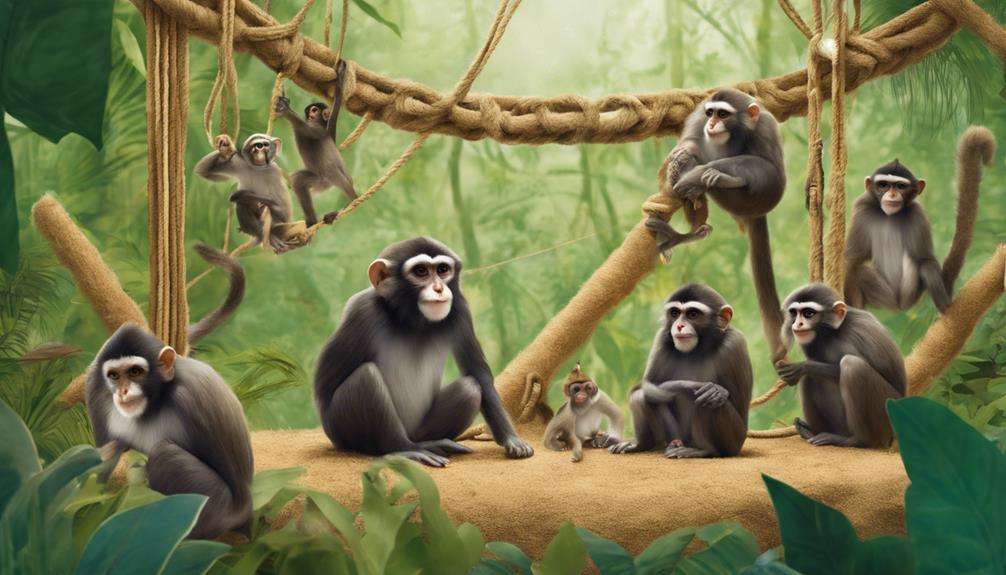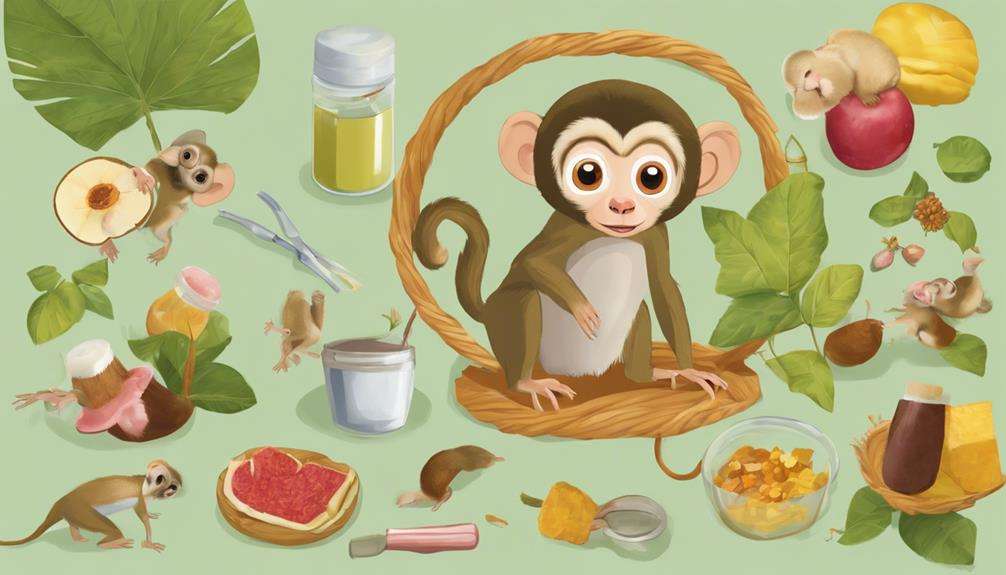You may think owning a rare primate as a pet could be an exciting venture, but before you jump into this unique world, consider the challenges and responsibilities that come with it.
The idea of having a Capuchin or a Chimpanzee in your home may sound intriguing, but the reality of their specialized care and legal implications might surprise you.
These rare primates may seem like intriguing companions, but there's more to the story that you need to uncover to make an informed decision.
Key Takeaways
- Capuchin Primates require deep understanding, lifelong care, and mental stimulation.
- Chimpanzees are discouraged as pets due to aggression and complex care needs.
- Macaque Primates need secure enclosures, specific diets, and mental stimulation.
- Tamarin Primates can be rewarding with specialized care and suitable environments.
Capuchin Primates as Pets
Capuchin primates, known for their mischievous behavior and high intelligence levels, present unique challenges as pets due to their territorial nature and demanding care requirements. As exotic pets, caring for your capuchin involves a deep understanding of their complex needs. Capuchins have a lifespan of around 40 years, requiring a long-term commitment from their owners. The necessity for diapers throughout their lives adds to the responsibility of caring for these primates.
To care for your pet capuchin, you must be prepared to handle their territorial tendencies, which can make them challenging to train. Providing mental stimulation is important due to their high intelligence levels. This may involve interactive toys, puzzles, and activities that engage their cognitive abilities. Additionally, capuchins need specialized care to guarantee their well-being and happiness in a domestic setting. Despite their appearance in entertainment, capuchin monkeys require dedicated attention and effort to meet their unique needs as exotic pets.
Chimpanzee as an Exotic Pet
Chimpanzees, as great apes native to Africa, exhibit exceptional intelligence and intricate social behaviors. These exotic animals require extensive space due to their active nature and need for mental stimulation. Chimpanzees have a long lifespan of up to 60 years, necessitating specialized care and a proper diet to guarantee their well-being.
However, owning a chimpanzee as a pet is strongly discouraged due to their potential for aggression, immense strength, and the risks they pose to owners and family members. Managing chimpanzees can be challenging, as their territorial and sometimes aggressive tendencies require careful handling. Despite sharing similarities with humans in DNA, the intelligence level and specific care requirements of chimpanzees make them unsuitable as pets.
Owners often face difficulties in meeting the complex needs of these primates, such as using diapers outside enclosures and providing secure and spacious environments to accommodate their natural behaviors.
Macaque Primate: Pet Considerations

When considering the suitability of a macaque primate as a pet, it's essential to understand their unique needs and the specific care required for their well-being. Macaques, smaller monkeys from Asia, can weigh up to 40 pounds and live for up to 30 years. These primates necessitate secure enclosures, specific diets, and mental stimulation to thrive in a domestic setting.
Macaques are characterized by their agility, curiosity, and the need for environments that cater to their natural behaviors. Proper care, attention to their enclosure, and a balanced diet are critical for the well-being of pet macaques. Owners must also consider providing UV light exposure to confirm adequate vitamin D production, essential for their health.
Owning a macaque as a pet involves comprehending their distinct requirements and creating a suitable environment that promotes their physical and mental health.
Tamarin Primates: Unconventional Pets
Moving on to the discussion of Tamarin primates as unconventional pets, one must acknowledge their unique characteristics and care requirements to make certain their well-being in a domestic environment. Tamarins, belonging to the New World monkey species, are small primates weighing less than a pound and typically living around 15 years. These tiny creatures require secure enclosures, specialized diets, and mental stimulation to thrive when kept as pets. Tamarins exhibit remarkable agility and curiosity, necessitating environments that cater to their natural behaviors for their overall well-being.
Proper care for Tamarin primates includes attention to enclosure setup and providing a balanced diet that meets their nutritional needs. While they may not be the most common choice for pets, Tamarins can be rewarding companions for those who are committed to offering the necessary care and environment for these unique animals. Consider the challenges and responsibilities that come with caring for Tamarin primates before deciding to bring one into your home.
Squirrel Monkey as a Unique Pet
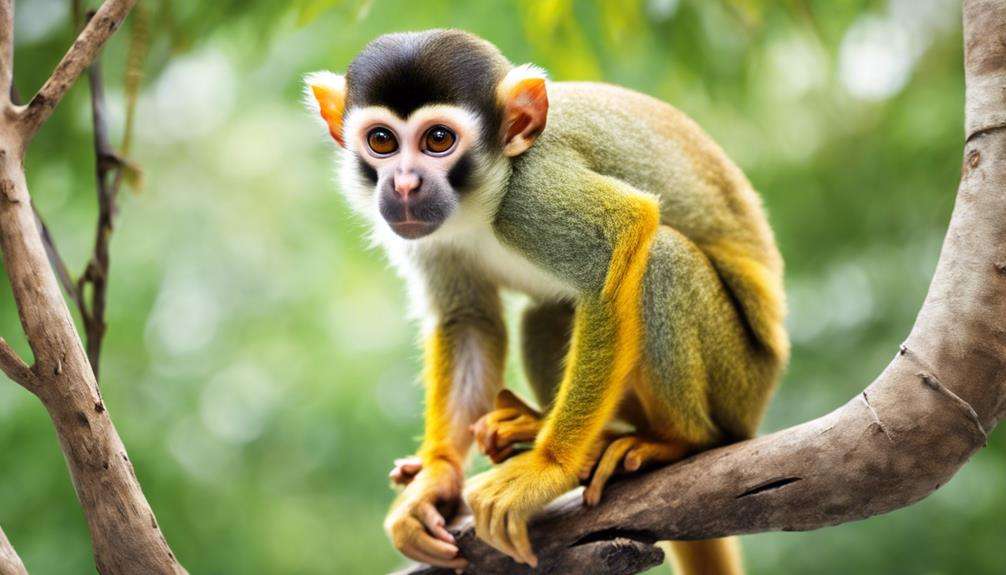
Squirrel monkeys, fascinating creatures native to the tropical forests of Central and South America, stand out for their social nature and acrobatic abilities. As a species, squirrel monkeys are enchanting due to their small size, typically weighing between 1-2.5 pounds, and their unique appearance, characterized by a short, dense fur coat that ranges in color from yellow to orange, with black markings on their faces.
These primates are highly social animals, living in large groups known as troops, which can consist of up to 500 individuals. When considering them as pets, it's important to understand their omnivorous diet, which includes fruits, insects, and small vertebrates. Additionally, their agile and acrobatic nature makes them energetic companions that require ample space and environmental enrichment to thrive.
Squirrel monkeys exhibit playful behavior and communicate within their groups through high-pitched vocalizations, showcasing their complex social structure and intriguing dynamics. If considering a squirrel monkey as a pet, it's essential to provide a stimulating environment that mimics their natural habitat to guarantee their well-being and happiness.
Frequently Asked Questions
What Primate Makes the Best Pet?
When looking at primate behavior and training, capuchin monkeys stand out. Their unique diets and need for enrichment make them engaging pets. Understanding their complex needs is essential for a fulfilling relationship with these intelligent companions.
What Primates Can You Own?
You can own certain primate species as pets, but it's important to understand their behavior, training needs, and legal regulations. Primates like marmosets and capuchin monkeys are popular choices, requiring specialized care.
Do Any Other Primates Have Pets?
Other primates as pets raise ethical concerns due to complex care needs. Legal restrictions often prohibit primate ownership for companionship. Providing proper diet, enrichment, and social interaction is challenging. Organizations advocate against owning most primates.
What Are the Most Harmless Primates?
For those curious about the gentlest primates, marmosets, squirrel monkeys, and lemurs stand out. Their small size, social behavior, and adaptability make them appealing pets. Consider these options before delving into primate behavior and conservation efforts.
Conclusion
You have explored the world of rare primates suitable as pets, each with their own unique needs and considerations.
Did you know that the average lifespan of a Capuchin primate in captivity is around 40 years?
This statistic highlights the long-term commitment and dedication required when owning these fascinating creatures, emphasizing the importance of responsible pet ownership and proper care for these exotic animals.
